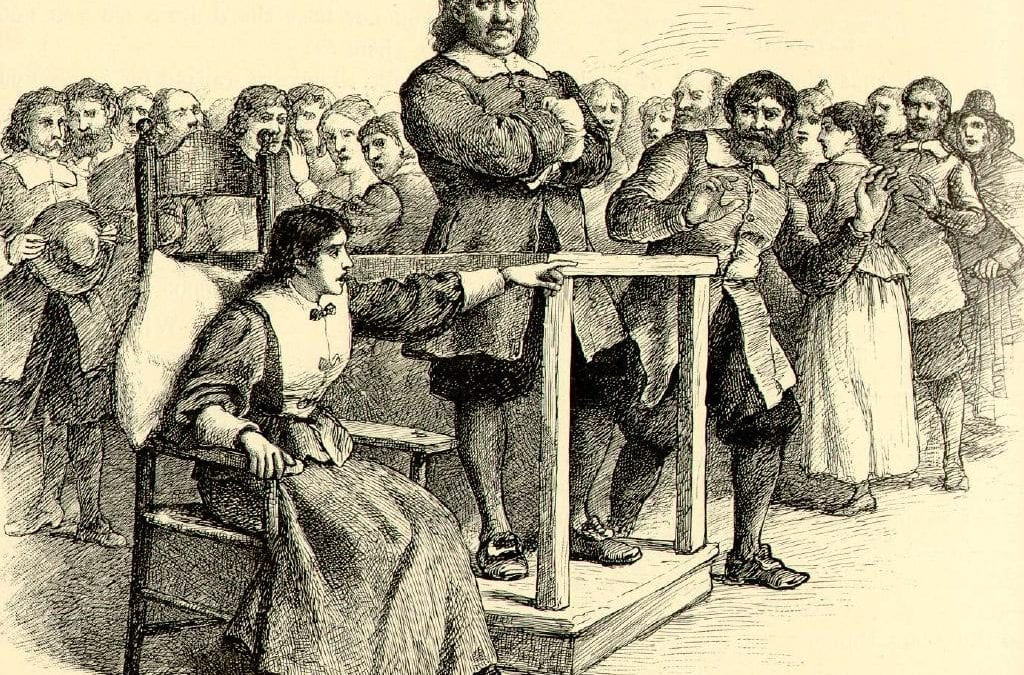Witches in the Classroom
On a sweltering June day in Atlanta three young women face the left wall of a nondescript GSU Aderhold building classroom and whisper to each other. Another woman sits at the front of the class regaled in a judge’s robe. The rest of the class sits quietly, waiting. Suddenly, two bedraggled figures burst into the room, staggering as if pushed. The three women turn in unison and begin shouting:
“That’s them!”
“I saw these heathens kissing the hoof of satan at midnight!”
“Look – can’t you see their names written in the black book?!?!”
Again, in unison, the three women fall to the ground in a faint. The trial begins.
Reacting to the Past
The preceding dramatic interaction reflects one type of educational role play activity called Reacting To The Past (RTTP). As you might have guessed this type of assessment involves students taking on roles, doing extensive research, and interacting with each other in character. RTTP scenarios may take place during a single class period or may last an entire semester. A growing body of research supports the effectiveness of RTTP with studies highlighting increased student retention, engagement, and analytical skills. As a side note RTTP isn’t just used in history classes. In fact, this method works well for any subject concerned with engendering disciplinary thinking.
Two Examples
The two examples below include a live recording of a RTTP session as well as a testimonial piece featuring both students and professors. You can find more videos like these on RTTP’s official Youtube Channel.
Setting Up and Assessing Role Plays
Ok, so let’s say that you’d like to start using role play in class. How do you go about setting these up and assessing them? Barnard College has an excellent guide on Reacting to the Past that can be generalized to other types of role plays. In short, you should consider:
- Game Setup: Will students work together or act out opposing viewpoints? How long will the game last? How much information should you give your students about RTTP versus plunging them into the experience? How much historical context should you give your students versus having them research areas on their own? How can you tie in-class dramatizations to graded assignments like participation, journaling, or essays? Additionally, will students be required to maintain their characters in their graded assignments?
- Game Play: What type of rules will the class adhere to? How flexible are these rules? Will you participate or act as a bystander? How does everyone know when the game is over?
- Game Debrief: How can the class best debrief their experience?
Online Role Plays?
So what if you teach an online class – can students still react to the past or perform other types of role plays? Absolutely! This type of exercise can be successfully – and authentically – carried out in both an asynchronous and synchronous setting. For instance in one of my own graduate education courses we were assigned to groups representing different educational theorists’ views. One member of each group volunteered to perform a main character (John Dewey, Arnie Duncan, Maria Montessori, Plato) while the rest of the group did extensive research on the assigned theorist’s beliefs, personality, and mannerisms. Finally, on a designated day we met online via video conferencing for an in-character educational debate. While the main actor performed the debate other group members sent her lines and ideas via private chat. As a student I found this assignment both challenging and immersive.
Asynchronous courses, on the other hand, lend themselves to lengthier correspondences between characters. Imagine your students taking on a part the first day of class and maintaining this role via the discussion board or other written communication tool for the entire semester. Alternately, you could have students upload videos in character. What type of impact might this long term role play have on your online students’ thinking or sense of community?
If you’d like to learn more about Reacting To The Past check out Barnard College’s extensive resource. UGS also hosts training and other events related to this pedagogical method.

